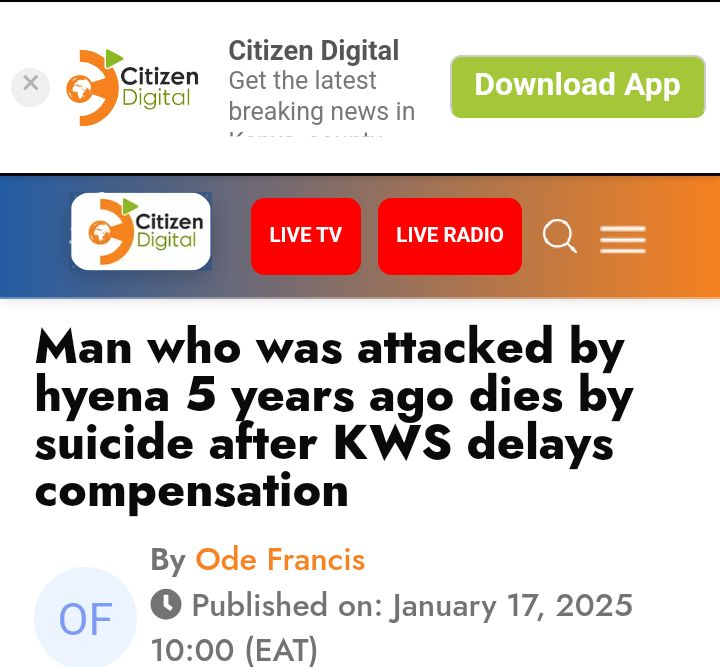In December 2024, Citizen TV highlighted the plight of Dismas Kogo, a security guard from Ngong, Kenya, who had been severely injured in a hyena attack five years prior.
The attack resulted in the loss of one of his fingers and inflicted deep wounds on his leg.
Following this harrowing incident, Dismas sought compensation from the Kenya Wildlife Service (KWS), but his efforts proved futile.
During the interview with Citizen TV, he voiced his deep frustration, revealing that the attack had derailed his aspirations to join the army and imposed a heavy financial burden on his family.
His parents were compelled to sell their belongings to cover his medical expenses, and the absence of compensation left him feeling despondent about his future.
Tragically, on January 1, 2025, Dismas was found dead in his home, having taken his own life.
His uncle, David Kiprito Leting, recounted the immense stress Dismas had endured while attempting to rebuild his life without the compensation he believed was rightfully his.

Leting disclosed that Dismas had received a letter indicating that compensation funds had been transferred to his bank; however, upon inquiry, no such funds were available. This disheartening revelation compounded Dismas’s despair, culminating in his untimely death.
Under the leadership of Director-General Erastus Kanga, KWS has faced numerous allegations of corruption, inefficiency, and a blatant disregard for victims of human-wildlife conflicts.
Despite the organization’s mandate to protect wildlife and provide restitution to affected communities, KWS has been plagued by significant delays in processing compensation claims.
The tragic case of Dismas Kogo, who ended his life after years of unfulfilled promises, starkly illustrates this systemic failure.
Moreover, internal strife within KWS has surfaced, with reports of power struggles and the suspension of senior managers under Dr. Kanga’s tenure.
In his initial months as Director-General, Dr. Kanga interdicted four senior managers for various alleged misdeeds, indicating efforts to address internal issues but also highlighting underlying problems within the organization.
Further compounding the organization’s challenges, KWS has been embroiled in procurement scandals that have eroded public trust.
Investigations have revealed instances where taxpayers paid double in KWS tenders, raising serious concerns about financial mismanagement.
In response to these allegations, Dr. Kanga’s office has maintained that his administration has done nothing wrong and is being targeted by “corrupt individuals.” These issues have not only tarnished the reputation of KWS but have also jeopardized its critical role in wildlife conservation and community relations.
The combination of delayed compensations, internal conflicts, and procurement scandals underscores the urgent need for comprehensive reforms within the organization.
Addressing these challenges is essential to restore public confidence and ensure that victims of human-wildlife conflicts receive the support and compensation they deserve.
Implementing transparent processes, holding officials accountable, and streamlining compensation mechanisms are critical steps toward achieving these goals.
While the Kenya Wildlife Service is entrusted with the vital responsibility of wildlife conservation and managing human-wildlife conflicts, recent events have exposed significant shortcomings in its operations.
The tragic case of Dismas Kogo, coupled with internal scandals and leadership challenges under Director-General Erastus Kanga, highlights the urgent need for reforms within KWS.


